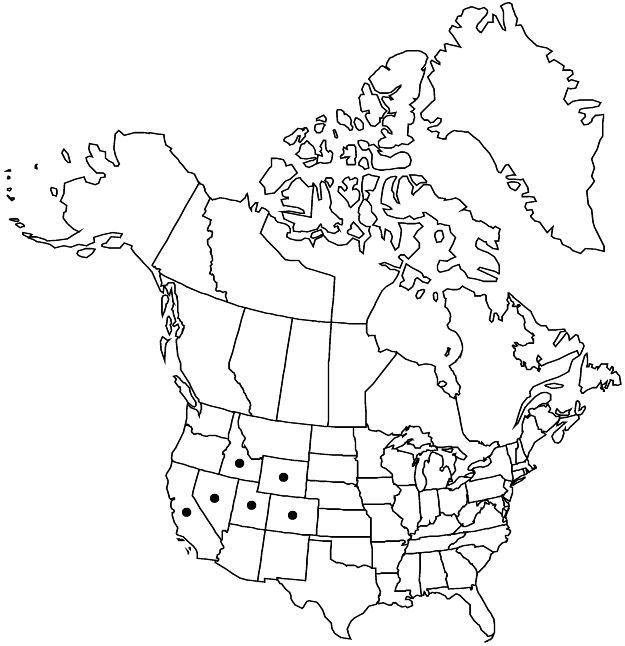Difference between revisions of "Physocarpus alternans"
Proc. Calif. Acad. Sci., ser. 4, 20: 130. 1931.
FNA>Volume Importer |
imported>Volume Importer |
||
| (3 intermediate revisions by 2 users not shown) | |||
| Line 15: | Line 15: | ||
|name=Neillia monogyna var. alternans | |name=Neillia monogyna var. alternans | ||
|authority=M. E. Jones | |authority=M. E. Jones | ||
| + | |rank=variety | ||
|publication_title=Zoë | |publication_title=Zoë | ||
|publication_place=4: 42. 1893 | |publication_place=4: 42. 1893 | ||
| Line 21: | Line 22: | ||
|name=Physocarpus alternans subsp. annulatus | |name=Physocarpus alternans subsp. annulatus | ||
|authority=J. T. Howell | |authority=J. T. Howell | ||
| + | |rank=subspecies | ||
}} {{Treatment/ID/Synonym | }} {{Treatment/ID/Synonym | ||
|name=P. alternans subsp. panamintensis | |name=P. alternans subsp. panamintensis | ||
|authority=J. T. Howell | |authority=J. T. Howell | ||
| + | |rank=subspecies | ||
}} | }} | ||
|hierarchy=Rosaceae;Rosaceae subfam. Amygdaloideae;Rosaceae tribe Neillieae;Physocarpus;Physocarpus alternans | |hierarchy=Rosaceae;Rosaceae subfam. Amygdaloideae;Rosaceae tribe Neillieae;Physocarpus;Physocarpus alternans | ||
| Line 48: | Line 51: | ||
-->{{#Taxon: | -->{{#Taxon: | ||
name=Physocarpus alternans | name=Physocarpus alternans | ||
| − | |||
|authority=(M. E. Jones) J. T. Howell | |authority=(M. E. Jones) J. T. Howell | ||
|rank=species | |rank=species | ||
| Line 63: | Line 65: | ||
|publication year=1931 | |publication year=1931 | ||
|special status=Endemic | |special status=Endemic | ||
| − | |source xml=https:// | + | |source xml=https://bitbucket.org/aafc-mbb/fna-data-curation/src/2e0870ddd59836b60bcf96646a41e87ea5a5943a/coarse_grained_fna_xml/V9/V9_577.xml |
|subfamily=Rosaceae subfam. Amygdaloideae | |subfamily=Rosaceae subfam. Amygdaloideae | ||
|tribe=Rosaceae tribe Neillieae | |tribe=Rosaceae tribe Neillieae | ||
Latest revision as of 22:57, 5 November 2020
Shrubs, 15 dm, densely branched. Stems orientation not recorded, brown becoming gray, stellate-hairy, glabrescent. Leaves: stipules oblong to narrowly elliptic or rhombic, 2–4 × 1.5–2 mm; petiole 2–10 mm; blade broadly ovate to orbiculate, 0.5–2 × 0.5–2 cm, slightly longer than wide, base rounded to truncate or slightly cordate, (0)3- or 5(7)-lobed, margins crenate to doubly crenate, apex rounded, abaxial surface more densely stellate-hairy (especially on veins), adaxial sparsely so. Inflorescences 5–10(–15)-flowered, open, umbel-like racemes, 3 cm diam.; bracts similar to stipules. Pedicels 0.6–1.5 cm, densely stellate-hairy. Flowers 7 mm diam.; hypanthium cup-shaped to campanulate, 1.5–3 mm, stellate-hairy; sepals pale green to white, darker in center, triangular to narrowly ovate, 2.5–3 mm, apex gland-tipped, surfaces stellate-hairy; petals white to pale pink, broadly obovate to orbiculate, 3 × 2.5 mm; stamens 20–30, unequal (alternately long and short), shorter than petals, anthers pink to dark brown; carpels 1(2), if 2 then connate at least 1/2 their lengths, indumentum not recorded. Follicles 1(2), pale buff, shape not recorded, 3–6 mm (lengths equal to or slightly exceeding sepals), densely stellate-hairy; styles 2.5 mm sometimes distinctly bent. Seeds 1 or 2, 2 mm.
Phenology: Flowering Jun–Jul; fruiting Aug.
Habitat: Dry rocky canyon slopes, among pinyon pine, juniper, and Cercocarpus woodlands
Elevation: 1500–3100 m
Distribution

Calif., Colo., Idaho, Nev., Utah, Wyo.
Discussion
The two subspecies described from California by Howell appear to be local variants with relatively small differences in leaf and hypanthium indumentum that probably do not merit formal recognition. Being drought tolerant, Physocarpus alternans should be considered more often for planting in dry habitats.
Selected References
None.